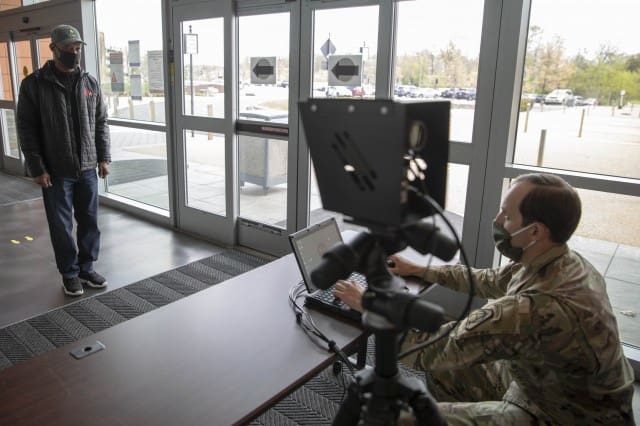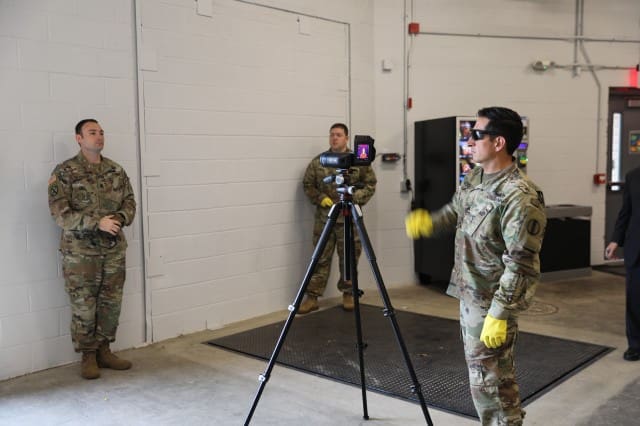
WASHINGTON – As part of the COVID-19 response, the U.S. Army Rapid Equipping Force, Program Executive Office Soldier and the C5ISR Center of U.S. Army Combat Capabilities Development Command led the initiative to use thermal-imaging devices to screen for potentially elevated body temperatures of personnel entering military facilities.
These stand-off thermal imaging capabilities provide significant advantages over hand-held thermometers as they provide a safe distance between the operators and subjects, and require less manpower. The technology, which does not require physical contact, processes information quickly, allowing a faster flow of traffic into buildings and facilities. Screening only takes a few seconds to measure temperature at a distance of 6-to-8 feet using a forward looking infrared sensor mounted on a tripod. If an elevated temperature is detected, individuals receive a secondary screening with a non-contact forehead thermometer. If a secondary screening confirms an elevated temperature, the individual will be encouraged to seek further screening with a medical provider.
Lt. Col. David Wilson, the lead for the REF’s rapid COVID-19 efforts, walked through the screening process at the Pentagon with Dr. Bruce Jette, Assistant Secretary of the Army for Acquisition, Logistics and Technology, and Dr. James A. Day, Executive Director of Security Integration and Technology for the Pentagon Force Protection Agency.

“This is a different adversary we are combating and, as always, it is our number-one priority to protect the force and community to ensure our safety, resilience and readiness,” Wilson said. “We are looking to the thermal-imaging sensors as one of many methods to prevent the spread and exposure of COVID-19.”
The REF worked closely with the Pentagon Force Protection Agency on employing thermal-screening capabilities, which began at the Pentagon Visitor’s Center April 22, 2020. Signs have been placed at various locations to inform personnel and visitors of the screening process. The Pentagon Force Protection Agency is looking to expand the thermal imagers to other areas of the facility, such as Metro entry points.
Also being deployed is the Thermal Imaging for Fever Screening Integrated Visual Augmentation System and the Future Weapon Sight-Individual. Through the close collaboration of government and industry, these systems were quickly modified for thermal-screening capability in a matter of days and put into pilot testing shortly thereafter. To date, thousands of people have been screened with these systems. The TIFS capability is currently deployed at Fort Benning, Georgia, and will expand to other military locations in the coming months.
All of the thermal-screening capabilities are set for broader distribution and use across the Army. Fort Belvoir, Virginia, was the first location to employ thermal-imaging devices for elevated body temperature screening at the installation’s hospital, exchange and commissary. The REF will deploy more thermal-imaging sensors throughout the National Capital Region, Army training centers and to U.S. Army North as one of the first measures of defense against COVID-19.
By PEO Soldier Public Affairs


The REF is really the most underrated program in the Army, great things they do, wish I interacted with them more. They deserve 10 times the funding they get.
Unfortunately, word is they are currently on the chopping block to be deactivated.
What type thermal imagers are being deployed?